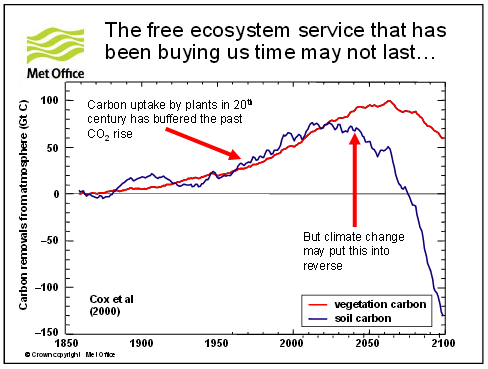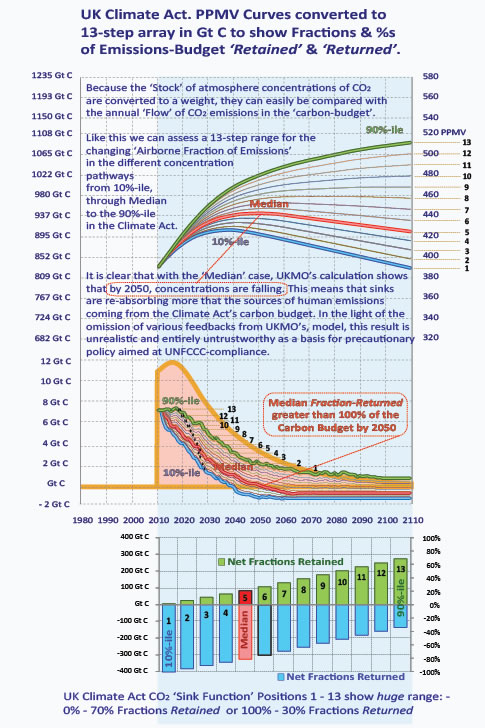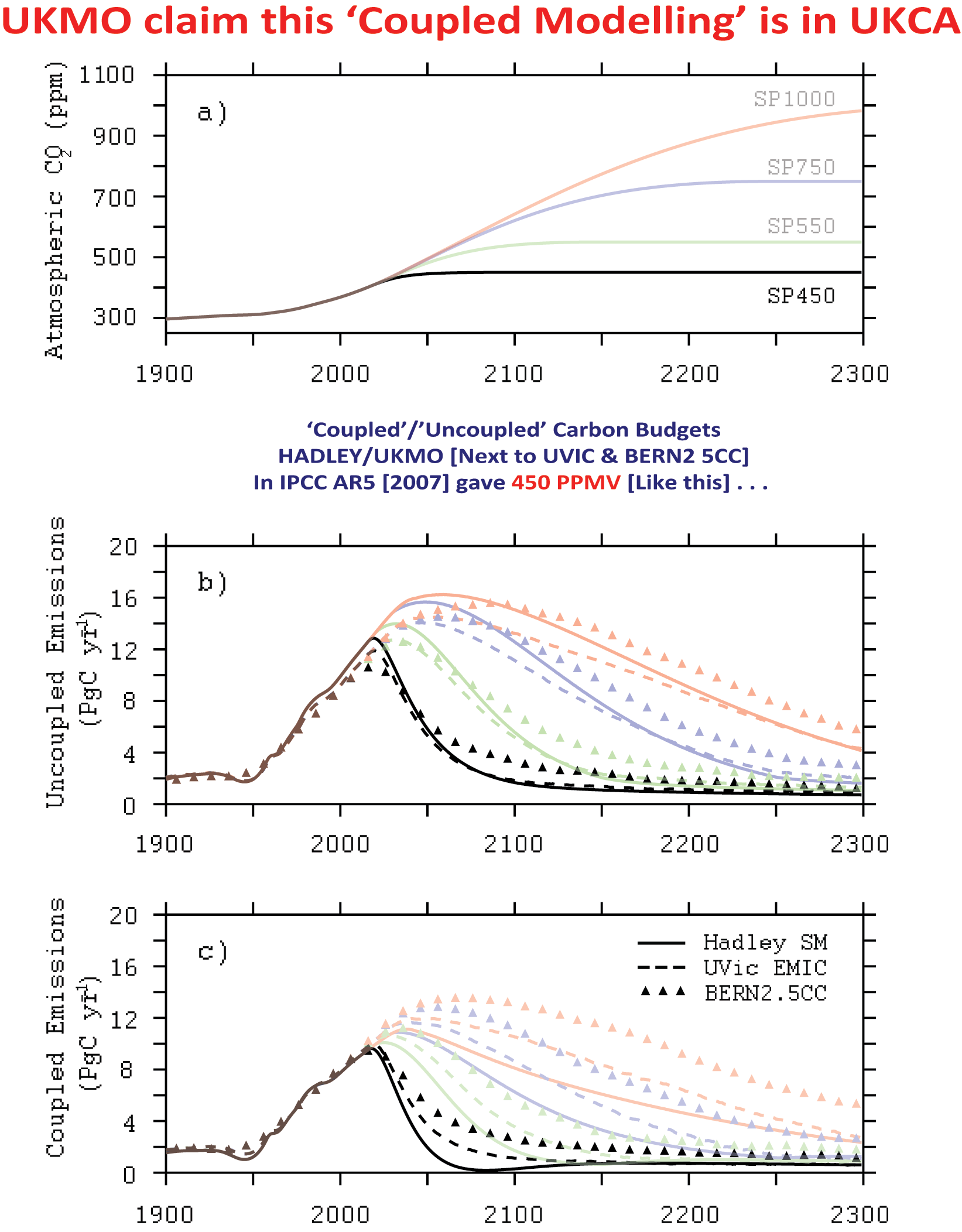Epimenides Paradox
"Everything I say is untrue." This is the classic statement of the the Cretan Paradox, also known as the Epimenides Paradox.
. . . if Pinnochio [the liar] said, "oooh . . . my nose is getting longer," would you believe him?
If this is what the UKMO's evidence to the EAC enquiry in 2013 was reduced to, would you believe them?
We use a full-earth systems climate model . . . . (that left all the feedback out, as confirmed in 2016 by DECC).
The UK Metereological Office [UKMO Hadley Centre] have for years been trying to develop an 'equilibrium climate-model'.
What they developed was based on the 'Berne Climate Model', results from which were first published by IPCC in 1994. Since then, the UKMO's model has flopped about between a climate-problem and the looming catastrophe of positive feedback as projected by UKMO at a conference at the Environmental Change Institute in September 2009 as the 'UKMO's expert Richard Betts' informed: -
. . . and a not-really approach as that positive feedback would [incredibly] be negative [not positive] feedback,
where the latter was finally used to generate the UK Climate Act which became UK law in 2008.
Here is the CO2 Contraction:Concentrations content of the UK Climate Act [UKCA], where they project their 'Median Case achieves over 100% sink-efficiency after 2050 as concentrations are falling, the path which they describe as 'most probable': -
LIke turning water into wine, this was a huge turnaround for UKMO.
It was understandably seized on by contrarians as further 'proof' of the UKMO repositioning itself to appear 'less extreme'.
Is that why they chose not to announce this 'incredibly good news' [its like a Holy Grail - just drink from this cup of the UK Climate Act and CO2 will just fall out of the sky after 2050?
However, the problems with this were legion, not least that it completely reversed all the positive feedback from coupled-carbon-cycle feedback modelled by the C4MIP group [in which UKMO participated] as reported in IPCC AR4 in 2007, where concentrations rise further as a result of 'coupling', they don't fall as was now projected by UKMO in the UKCA: -
Animated in detail for Minister Hilary Benn in 2008 here [button 2].
However, at the EAC Enquiry into this whole affair in 2009, the UKMO was obliged to concede to the record that major feedback effects had in fact been omitted from their no-problem version of the model. Consequent to that they went on record laying out in detail all the feedback effects which were omitted, admitting that these [like Permafrost melt] were 'a big deal'.
All the UKMO's published admissions of feedback omissions were cited in GCI's evidence to the current EAC Enquiry. It couldn't be clearer as the sampling listed below shows. Moreover, this evidence was distributed to Committee members and the UKMO before that session of the Enquiry and it was discussed at the EAC Equiry session on the 12th of June 2013.
When questioned by EAC Committee Member Martin Caton about this evidence, UKMO's Chief Scientific Officer [CSO] Julia Slingo, with Mr Winston Lowe of UKMO at her side, stated decisvely that it was all 'absolutely untrue'.
The clear and alarming message in her reply was that the CSO told the EAC Enquiry that, 'Everything we have said about feedbacks omitted or included is absolutely untrue?'
Is that what the Julia meant? When she stood up and denouced her 'enemy' by shooting herself in the head, it was like Pinnochio cutting off her nose to spite his face; the Epimenides Paradox + nose-bleed.
Was she really trashing Nicholas Stern for example who in May 2013 told the IMF: -
”The scientific models mostly leave out dangerous feedbacks/tipping points.
We need new generation of models.”
Or was her target UNEP who published this in 2012: -
“All climate projections in the IPCC Fifth Assessment Report, due for release in 2013-14, are likely to be biased on the low side relative to global temperature because the models did not include the permafrost carbon feedback.”
On the other hand was Julia admitting to having deceived House of Commons by UKMO first saying the feedbacks were in, and then saying they weren't, and then saying it was all 'absolutely untrue'.
Perhaps afterall, it doesn't really matter as the Chair of the Committee has written to say that everything said is 'protected by 'Parliamentary Privilege'. It is only Contempt for the House if you lie knowingly.' So the questions are, did Epimenides know he was lying when he said "everything I say is untrue?" and who'll be the judge of that? [Well Pinnochio - obviously].
~~~~~~~~~~~~~~~~~~~~~~~~~~~~~~~~~~~~~
In the George Orwell Novel 1984, there is a touching scene at the end between Julia and Winston
Some time after being restored to orthodox thought, Winston encounters Julia in a park.
It turns out that Julia has endured a similar ordeal to Winston, and has also been purged of rebellion.Each admits betraying the other:
"I betrayed you," she said baldly.
"I betrayed you," he said.She gave him another quick look of dislike. "Sometimes," she said, "they threaten you with something – something you can't stand up to, can't even think about. And then you say, 'Don't do it to me, do it to somebody else, do it to so-and-so.' And perhaps you might pretend, afterwards, that it was only a trick and that you just said it to make them stop and didn't really mean it. But that isn't true. At the time when it happens you do mean it. You think there's no other way of saving yourself and you're quite ready to save yourself that way. You want it to happen to the other person. You don't give a damn what they suffer. All you care about is yourself."
"All you care about is yourself," he echoed.
"And after that, you don't feel the same toward the other person any longer."
"No," he said, "you don't feel the same."
Throughout, a song recurs in Winston's mind:
Under the spreading chestnut tree,
You sold me and I sold you
Here I lie and Here lie you
Everything we say's untrue . . . .
To Be or Not To Be
Conscience making cowards of us all, as Shakespeare once said . . . .
"The Slings and Arrows of outrageous Fortune"?
What you can be quite sure of is that as with Climate-Gate, Climate-Contrarians will have a field day over this - its even better than the 'Quaker Guns' [the biggest Confederate Bluff in the US Civil War] that held Unionists at bay for years with a row of logs painted black [to look like cannons from a distance].
~~~~~~~~~~~~~~~~~~~~~~~~~~~~~~~~~~~
THE UKMO ADMIT FEEDBACKS ARE OMITTED FROM THEIR MODEL
In June 23 2009 Professor Mitchell of the UKMO claimed to the EAC Enquiry that all relevant feedbacks were in the climate models behind the UK Climate Act: -
“The models will take into account all the feedbacks we are aware of that we think are important, then we can quantify that we understand, and to that extent the Climate Change Committee has obviously done that. Science being science, we uncover new feedbacks and there is a delay in being able to incorporate those in the complex models.
One can use simple models to get, if you like, a fast-track estimate of what the effect would be, but one would have to refer to the more complex models to make sure that when you add that additional feedback you are actually taking into account all the processes that are important.”
This was an incorrect and misleading statement. The UK Climate Act is a product of this and in November 2010 the UKMO put the following admission on its website: -
Are there feedbacks that aren't included in the models?
“There are some feedbacks we have recognised but remain big uncertainties. We don't know enough about them to include their effects in climate models. However, they are potentially very serious so there is still a lot of work going on to try to understand them and get them into our projections.”
Methane hydrates (positive feedback)
“These are potentially a very big deal which could change our whole understanding of climate change, but it's very uncertain.
There are very large stores of methane locked away at depth in the ocean. We know the stability of these stores is dependent on temperature. As the oceans get warmer it's possible this balance could be upset and the stores released — which would be very serious. Methane is more than 20 times as potent as CO2 as a greenhouse gas.
There's some evidence to suggest that going back over a very long historical period (more than millions of years), the release of these methane stores may have played a big role in abrupt and severe changes to past climate. How close we are to any possible threshold is very much an open question.”
Permafrost methane (positive feedback)
“This is a big question mark but also potentially a very big deal. There are very organic rich soils in certain parts of the world. At higher latitudes, these are frozen over by permafrost, and those greenhouse gases are effectively locked away. When the soil thaws due to rising temperatures, these gases could become unlocked and be released as CO2 or methane. At the moment we don't know how much of the CO2 is stored away or to what extent it would be released when the soil thaws. These are two key questions, and we need to figure out how to resolve them on a global scale in a climate model before this effect can be included in our projections. Within the next five years we hope to know enough about this process to start including its effects.”
Could there be other feedbacks that you don't yet know about?
“Yes, we assume there are hidden feedbacks in the system, but as long as we keep climate change relatively small we can be confident these unknown issues won't come in to play. However, as we move further away from the present climate, we are exposing ourselves to more risk about these unknowns. Even only taking into account the climate feedbacks we are aware of now, they pose a great incentive for us to quickly reduce our greenhouse gas emissions to keep global temperature rises to a minimum.”
Last Updated: 29 November 2010
Aligning itself with the RCP scenarios apparently now the basis of IPCC AR5, UKMO published the ‘Advance Paper’ in 2010 last updated 29/04/2013: -
The climate-modelling in this paper continues to omit the feedbacks listed on page 18 of the ‘Advance’ document, as do the RCP scenarios with which UKMO aligned itself.
“We will continue to improve the representation of processes included in our model.
There are also a number of processes not currently included that could potentially have a major impact on the degree of warming for a given emissions scenario, quite apart from their impact on local and regional climate. Some of these processes have been discussed here and we are actively working on including them in the model: -
- The impact of ozone on plants reduces their ability to take up carbon. Given their major implications for international technology and economic development, policy decisions on climate change must be underpinned by the best possible evidence.
- The deposition of black carbon on snow changes the reflectivity of the surface leading to more warming at high latitudes. Other processes are less well understood but are actively being researched with a view to including them in future models.
- The ability of plants to take up carbon may be limited by the supply of nitrogen available naturally, but may be enhanced by man-made sources of nitrogen. Climate change itself may also increase available nitrogen and stimulate plant growth.
- The thawing of permafrost may lead to large amounts of carbon release, but these processes are not well understood.
- Dynamic ice processes could speed up freshwater supply from glaciers into the ocean.
- The processes that affect methane in the Arctic Ocean could lead to increased methane release (the science is poorly understood so may take longer to include in models).
- The international science community is working hard to understand and narrow the uncertainties in future climate projections — and it is doing this primarily through model inter-comparison projects, comparison with observations, and the synthesis of results by the next IPCC report.
- Understanding the interactions within the Earth system is critical.”




